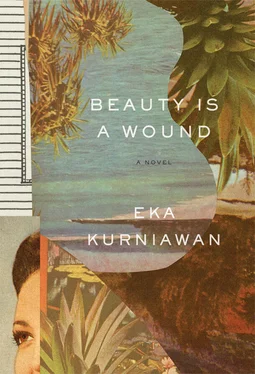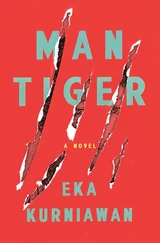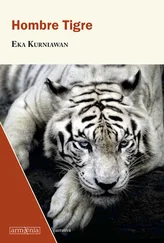Maman Gendeng began to regret all the times he had gone to Mama Kalong’s whorehouse to sleep with his mother-in-law, when he had such an amazing wife. One evening, he returned to the brothel and met Dewi Ayu, who asked him with a chuckle, “Let me guess, you still haven’t touched your wife and want to sleep with your mother-in-law?”
“I just came to say that I will never touch you again.”
Now that surprised Dewi Ayu, and she asked him, “Why?”
“With a wife as wonderful as your youngest daughter, I don’t want any other woman ever again.”
And Maman Gendeng quickly left Dewi Ayu, longing for his wife who was waiting at home.

AFTER HE TOOK the chopped-up pieces of almond tree firewood to Alamanda’s wedding, Comrade Kliwon gathered with his friends on the beach. Ever since he was little he had been quite fond of the ocean. He had lived among fishermen and went to sea just as often as the fishermen’s sons did. He had nearly drowned as many times as a farmer’s son accidentally cuts himself with his machete. He didn’t want to go back to the mushroom farm — it reminded him too much of Alamanda and he didn’t want to dwell on those bitter memories.
With two of his old friends, he built a small hut on the beach behind some pandan bushes. He would go night fishing with Karmin and Samiran and they’d split their catch with the guy whose boat they borrowed. At midday, after a short nap, he would study Marxist books and teach his two friends everything he learned. He often went to the Party headquarters on Jalan Belanda, and he struck up a correspondence with some communists in the capital. During his short time in Jakarta he had joined the Party school and made many new acquaintances there.
His pen pals sent him periodicals and magazines, and the Party sent their newspaper to his little hut. Books began to pile up in one corner, meaning he could study exactly what Marx and Engels and Lenin and Trotsky and Chairman Mao had said, and he could read pamphlets written by locals like Semaun and Tan Malaka. A number of these writers, like Trotsky and Tan Malaka, were in fact sort of forbidden, but someone in the Party obtained their books especially for Kliwon.
He wasn’t truly a Party member yet, just a candidate. He studied all the material on his own, and diligently attended the political discussions the Party offered, appearing at the podium whenever the opportunity arose. He organized the fishermen and the plantation workers. Six months after Alamanda’s wedding, the chairmen at the Party headquarters decided that he was the best cadre in his region and he was accepted as a full member of the Communist Party. He was assigned his first task, which was to gather the remaining guerrillas from the revolutionary army, the majority of whom had been communists, the men who had fought in the war alongside Shodancho’s soldiers, scattered after the failed rebellion those many years ago. Now they were rejoining the Party with a romantic nostalgia for revolution.
The Fishermen’s Union was founded then, with Samiran and Karmin as its first members and Comrade Kliwon as its chairman. Within two weeks there were fifty-three members, and soon almost all of the fishermen had joined the Union. Every Sunday, when they didn’t have anything important to do, the fishermen would gather in the yard of the fish market, right next to the port. Comrade Kliwon would hand out Party propaganda and explain the threat that the large fishing vessels posed to their livelihood.
Now all the fishermen’s ceremonies were taken care of by the Union. Comrade Kliwon would give a short speech that quoted a few sentences from the Manifesto before a cow’s head would be tossed into the ocean as an offering to the queen of the South Seas. He also did this at the funerals for fishermen who died under the pounding waves, and when the fishermen held their blessing ceremonies, giving thanks for the good weather with a sintren performance.
All the folk songs had been replaced with the Internationale , and all the closing prayers were offered with, “Workers of the world, unite!”
“I’m like a missionary spreading a new religion,” said Comrade Kliwon, chuckling with his friends at the Party headquarters. “With the Manifesto as its holy book. That’s the most important task for communists or religion — gathering followers.”
Those were busy times for Comrade Kliwon. In addition to his organizing and his propaganda, he also began to teach in the Party school, offering political courses for new cadre. He still went to sea and took care of the Fishermen’s Union, and seemed to enjoy it, so when the Party offered him the chance to continue his studies in Moscow, he demurred and chose to stay in Halimunda.
The only time he could relax was in the morning when he got home from the sea. He’d sit in front of his hut reading three newspapers that prided themselves on arriving in Halimunda before breakfast. He read the People’s Daily , the Communist Party newspaper; the Eastern Star , which belonged to another party considered an “ally”; and a local Party newspaper published in Bandung. He read and drank his coffee before going off to bathe in the open air spring behind the hut, eating breakfast, and then sleeping until midday.
Once, in the middle of his morning routine he saw seven schoolgirls walking eastward on the sand. Comrade Kliwon glanced at them, but it was normal to see gangs of school kids bored with their studies playing hooky at the beach, so he didn’t make much of their presence and returned to his coffee and his newspapers. He hadn’t yet finished the lead article on the first page — to be continued on page eight — when he heard some commotion coming from those girls (there was no way it was coming from anywhere else because the beach was almost always deserted at nine in the morning). He heard them screaming shrilly — not the squeals of naughty kids, but cries of fear.
Comrade Kliwon set down his newspaper and walked toward the girls in the distance who were scattering, running back and forth, and all of a sudden one girl broke away from the group, chased by a dog. There were too many wild dogs in Halimunda, thought Comrade Kliwon, ever since Shodancho began breeding them.
He wanted to help the girl, but the girl was too far away and the dog was only ten feet behind her. When the girl saw him and realized he was witnessing her terror, she ran toward him with the dog in pursuit behind her, barking fiercely. Comrade Kliwon finally ran toward them, as the girl screamed in panic, “Help!” while her friends were shrieking far behind her.
Comrade Kliwon sped up his pace but what was extraordinary, and what he only realized after, was how fast the girl was going. Amid the screams and barks she was able to hold her distance from the dog’s ferocious muzzle, and as he drew closer, Comrade Kliwon could see for himself that the distance the girl had covered was twice as long as the distance that he himself had, despite the fact that he had run as hard as he could to reach her. He could see the terror on the girl’s face, and from a distance of five feet she leapt at him, grabbing tightly onto Comrade Kliwon just as the dog also leapt, thinking this was the perfect time to bite her. But Comrade Kliwon moved faster and right at that exact moment he struck the dog as hard as he could on its jaw, sending it flying back to howl for a moment before sprawling out motionless, with foam around its mouth. The dog had rabies, and he was dead.
Now Kliwon had a schoolgirl holding him tight, the first time since Alamanda’s wild kisses in front of the train station. Even though a number of girls and young mothers still made eyes at him, he’d thrown off his reputation as a lady-killer and devoted most of his time to the Party and work, and didn’t have any time for flirtation or seduction. But now this girl was clutching him close and without realizing it — just to protect her from the rabid dog — he found himself returning her embrace.
Читать дальше












